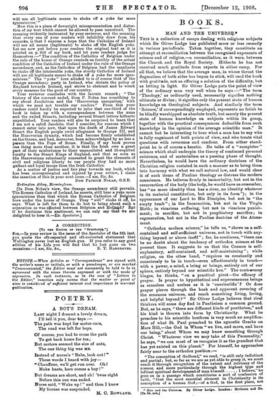"THE IRISH DAMES OF YPRES."
[To THE EDITOR 01 TEl "SPECTATOR."] Sts,—A friend has drawn my attention to your review of my book, "The Irish Dames of Ypres," in your issue of Novem- ber 28th, in which your reviewer, having branded the gallant martyr Earl of Northumberland as a rebel, makes the following surprising remarks :—" But our author frankly avows his own disloyalty. After speaking of the Dutch rule over Belgium, he [i.e., the author] goes on : The sturdy Catholics of Ireland will use all legitimate means to shake off a yoke far moro ignominious.' "
Now this is a piece of downright misrepresentation and distor- tion of my text which cannot be allowed to pass unnoticed. The meaning evidently insinuated by your reviewer, and the meaning that every one of your readers will infallibly draw from his remarks, is that I express a hope that the Catholics of Ireland will use all means (legitimate) to shake off the English yoke. Let me now put before your readers the original text as it is printed on p. 316 of my book, and let your readers judge for themselves The condition of the Catholics of Belgium under the rule of the house of Orange reminds us forcibly of the actual condition of the Catholics of Ireland under the rule of the Orange ascendency, and, as the Catholics of Belgium had the manliness to shako off the intolerable yoke, the sturdy Catholics of Ireland will use all legitimate means to shake off a yoke far more igno- minious." The "yoke" here alluded to is of course that of the Orange ascendency party in Ireland, who dictate the policy of England towards Ireland, and strive to obstruct and to wreck every measure for the good of our country.
Your reviewer concludes with the laconic remark ; " The
history of the convent ended, Dom P. Nolan has something to say about Jacobitism and the 'Hanoverian usurpation,' with which we need not trouble our readers." From this your _readers could hardly be expected to infer that one-third of the book is taken up with a correspondence between the nuns and the exiled Stuarts, including several Stuart letters hitherto unpublished. Your readers will also be surprised to learn that I am not a rabid Jacobite, that I consider, for reasons which I cannot enter into now, that upon the death of James Edward Stuart the English people owed allegiance to George III. and the Hanoverian dynasty, which bad become firmly established on the throne, and had, moreover, been acknowledged by no less a person than the Pope of Rome. Finally, if my book proves one thing more than another, it is that the Irish owe a great part of their misfortunes to their unparalleled and ill-requited loyalty to the Stuart Kings of England, and that as soon as the Hanoverians reluctantly consented to grant the elements of civil and religious liberty to our people they had no more gallant and loyal troops than the Irish Catholics.
As a matter of justice and fair play towards my book, which has been misrepresented and injured by your review, I claim the insertion of this in your next issue.—I am, Sir, &c.
DOD! PATRICK NOLAN, O.S.B.
Erdington Abbey, Birmingham.
[In Dom Nolan's view, the Orange ascendency still prevails. The Roman Catholics of Ireland, he asserts, still bear a yoke more
ignominious than that which the Roman Catholics of Belgium
bore under the house of Orange. They "will" shake it off, he says. What is left for them to do but to bring about such a separation as was effected between Belgium and Hollaxid? Bat if he disclaims this sentiment, we can only say that we are delighted to hear it.—ED. Spectator.]































































 Previous page
Previous page